#Marguerite has produced yet
Explore tagged Tumblr posts
Text

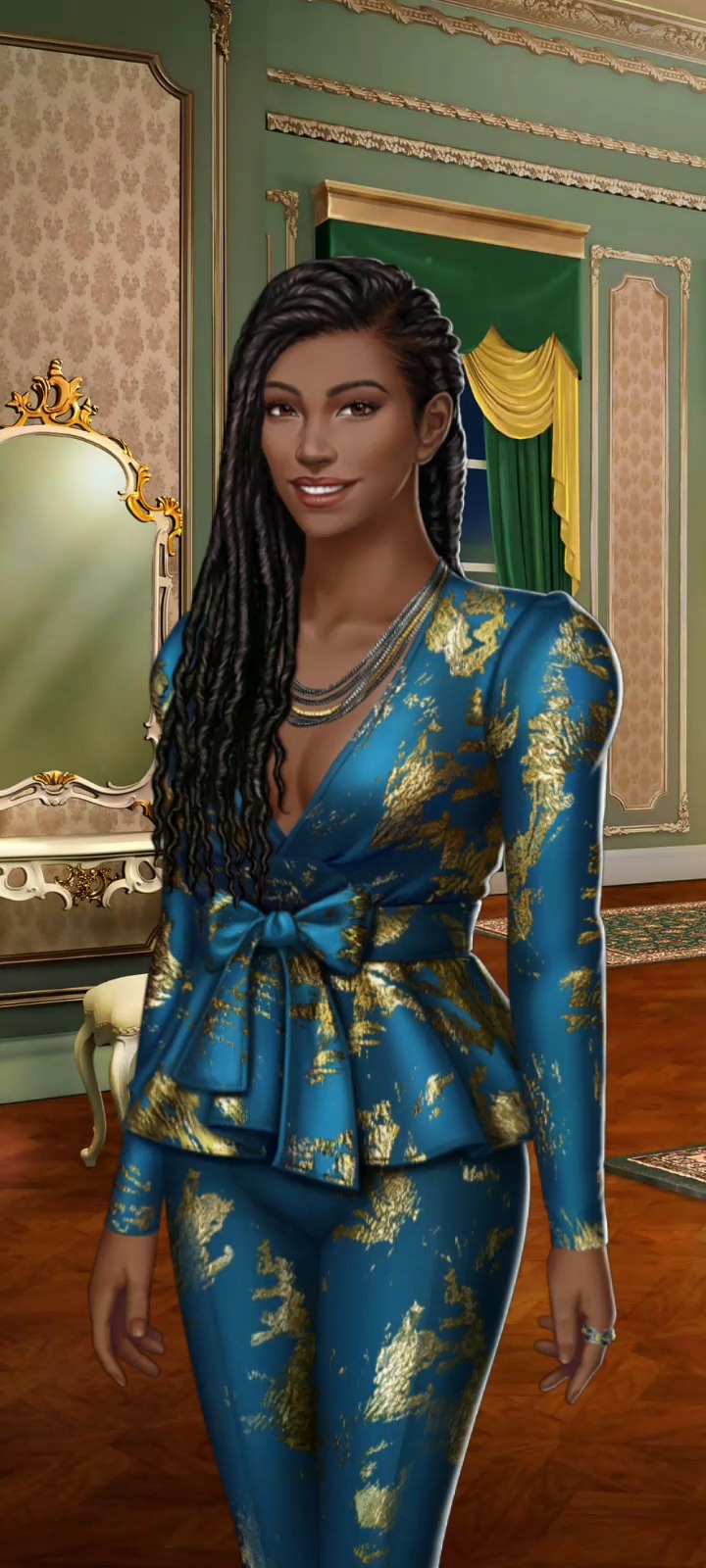
Everybody was bitching about how the feminine body mc and the m!Trystan looked like Christmas ornaments but no one is talking about the travesty that is the f!Trystan's outfit 😭 like wtf is that bow around her waist?? And if those pants were any tighter we'd see a camel toe!
#Marguerite did my baby so wrong#Mc looks good#That's literally the only good outfit#Marguerite has produced yet#But trystan's outfit looks like shit#Cop2#crimes of passion 2#choices#pixelberry#playchoices#trystan thorne#f!trystan thorne#F!Trystan#Trystan
27 notes
·
View notes
Text
21/30 Tales from the Crypt
(Previous) | (Index) | (Next)
⛬
We return to that movie that the crabs shall dance for when it is done, Prometheus.
This time, the movie decided it needed a zombie mutant in it for some reason. Content warning for half-hearted body horror and gore.
I’m sure maybe half of a person out there was wondering “Hey, what happened to Fifield the geologist?” Well, the crew certainly wasn’t wondering that. They’re quite surprised when his suit camera feed shows up right outside the ship. Janek says it “just popped up” but why the hell would it. Fifield didn’t turn it back on, that much is obvious. Did the plot flip the switch or something?

In any case, Fifield has taken up a new career since we last saw him. He is now a contortionist.
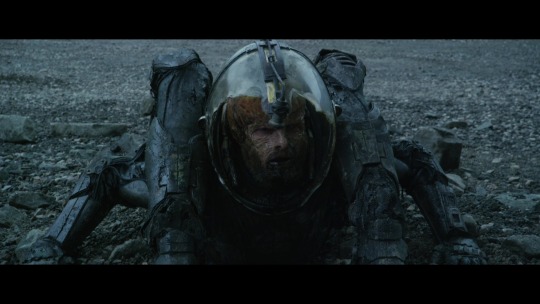
This confuses the nameless crew guy. This is a very weird way to announce your new hobby to your coworkers.


Seriously, like. This is just an extreme backbend. It was probably done with prosthetics since they needed a body for this guy later anyway, but there are people who can just do this. Look, here’s a woman named Anna McNulty, doing this exact pose. It’s way weirder-looking when the person’s in motion! Again: not scary, just weird!

Contortionists are a thing in horror movies and shows. The explanation given always boils down to “they look uncanny and inhuman when they pretzel themselves, thus they are scary.” That isn’t really the case.
It still takes acting ability to make contortionism scary. Combine that with unsettling effects and you can get something memorably spooky, even when the rest of the movie isn’t that great. Javier Botet’s performance in Mama (2013), for example, was enhanced by his own acting decisions, the costuming, CG, and also practical puppetry of his body so that he could be supported in positions that felt unnaturally weightless.
Even if you’re lacking good direction or acting skills, makeup can still put in a lot of work to get you something freaky. And this makeup is… not their best.
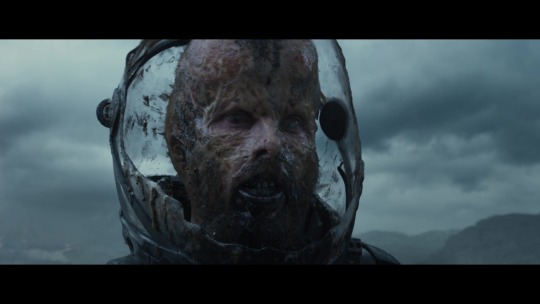
Not in terms of quality of workmanship, but in terms of the concept itself. The creature department made a whole bunch of draft sculpts that looked way more xeno-y. Those were rejected. Instead, he’s got a big lumpy head. He looks like he wandered out of The Hills Have Eyes: Part II.
youtube
[Video description: A trailer for The Hills Have Eyes: Part II (1984). It’s complete schlock, and it’s got a big guy with a big prosthetic forehead in it, and he smashes people. There’s an off-brand Darth Vader breathing noise for some reason.]
Really, this design is straight out of a few sub-genres of horror I could mention: The Hills Have Eyes comes from cannibal and/or hillbilly horror (also called hixploitation), which often features deformed or mutated antagonists. Nuclear, infection, and chemical-scarred mutants are common lumpy monsters in horror, from 50s B-movies to Troma splatter films to modern “torture porn”. Video games tend to follow Resident Evil’s lead and make the lumpiest creatures zombies, while also making them WMD mutants and/or backwoods types, hello Marguerite and Jack Baker.
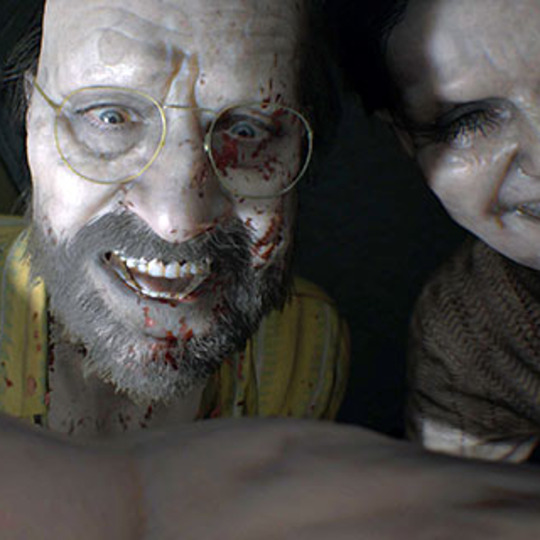
Obviously, Fifield’s been mutated by the black goo, adding to the list of things it’s capable of that the movie failed to set up before now. I will attempt to follow the ideas this may be attempting to throw at us, but I want it noted, this takes work.

This man has been exposed to a biochemical weapon, created by the Engineers. They were stockpiling that weapon here with the intent to use it on Earth. God decided rainbows aren’t a covenant anymore, time for Noah Part 2: Even Drownier.

But the Engineers are not gods in the christian sense, they aren’t all-powerful, and they are not beings that anyone would assert are omnibenevolent. They are another intelligent, social humanoid species with their own culture and morality. What moral standards do the Engineers have that produce a later scene, where one of them will look unsettled by a display of inter-human violence, yet also intend to kill every human? Humans are in some ways their descendants. What would be the right thing to do if your children became murderers?
The movie doesn’t have to answer that, because there is no objectively right answer, but it also doesn’t present the issue very competently when it's having a mutant geologist pull wrestling moves.

youtube
[Video description: A short compilation of Macho Man Randy Savage doing the double axe handle.]
The questions that FIfield’s current state actually brought to me were more like this:
What horror sub-genre are we in? Is this a pastiche? Is it being done on purpose?

The answers, as far as I can tell, are “all of them,” “yes,” and “I have no idea.” I still don’t know. This is too bizarre a series of decisions to feel unintentional, and yet it’s pulled off with so little grace that it also feels like it can’t be intentional. It is Schrodinger’s Script, suspended in a state of both “hack job” and “competent hack job” until someone observes the movie and forms an opinion.
Speaking of being observed: these crew members. Boy. They sure are here, aren’t they.

There’s seventeen crew on the Prometheus, and a movie with strong characterization will make it so you can remember that many people, even if their roles are small and unnamed. Fellowship of the Ring (2001) manages to outdo that, for example. Before I started writing this, I could remember less than half the people onboard Prometheus.
So, obviously these guys exist to get destroyed before the miniboss fight is over.


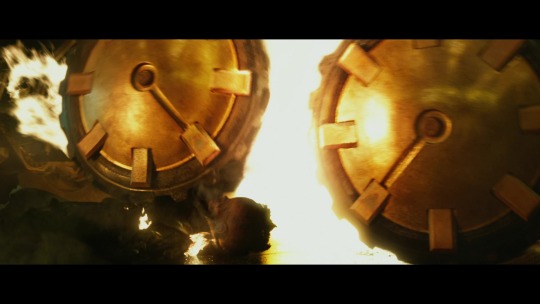
It isn’t even that much of a scene. Mutated Fifield jumps around and wails on guys, the guys freak out and accidentally kill at least one other guy, and then FIfield gets run over by the transport. When this was originally filmed, it was going to be placed slightly later and Shaw would be the one driving it, but that wouldn’t have improved this any, to be honest.
So, great. We have killed a few more cast members for some reason. It fails as horror, and it fails as bloodsport. Good job everyone.
Next time, the horror anthology continues with our host, the Crypt Keeper.
Oh, sorry, that’s not what happens–I meant to say: “Next time, Peter Weyland wakes up”.
⛬
(Previous) | (Index) | (Next)
⛬
Citations for alt-text rambles:
https://www.youtube.com/watch?v=KOlpoG-rZXI
#Prometheus 2012#Prometheus (2012)#I did not think I'd be making a Hills Have Eyes 2 reference as part of the Prometheus milieu#but the movie proved me wrong once again
25 notes
·
View notes
Text
Blessed Virgin Mary and Rosa Mystica

The Holy Virgin by Michelangelo Blessed Virgin Mary and Rosa Mystica, an article with some quotes and a personal story on the Holy Virgin, divine symbol of motherhood, love, life and sorrow, with reference to Rosa Mystica apparitions. Close to December 8th, the day on which the Immaculate Conception of the Blessed Virgin Mary is celebrated, and preparations for Holy Christmas begin, I want to dedicate this article to my mother, Innocenza Laffranchi, who recently passed away, to her godmother Lina Bonazza, to her sister Lucia, and her brothers, Don Enrico and Arturo, all people with good and generous hearts, very religious and above all devoted to the Holy Vergin Mary. A memory also to Sister Iginia, choir teacher of the parish of Leno (Brescia), where my mother sang as a child. At the time my mother was very young and happy, she wasn't married yet, I wasn't born, and she had not yet suffered the difficulties and the pains of life, above all due to her illnesses in the old age. She died at 90 years old, and when she physically disappeared I felt to have lost not only a mother, but also a child and what's more, a person who always loved and took care of me, even in the most difficult moments. That's the reasons why I like to associate her and also all the women of this earth to the Blessed Holy Virgin Maria. Only after losing your mother forever you can understand the essence of true love and the excruciating pain of life passing away. Carl William Brown O Virgin Mother, daughter of your own Son (of Christ-God), the most humble and the highest of all creatures, fixed term of divine wisdom, you are the one who has ennobled human nature to such an extent that its Creator did not disdain becoming his creature (with the Incarnation). Dante Alighieri: The invocation to the Virgin (Paradiso, XXXIII, 1-39)
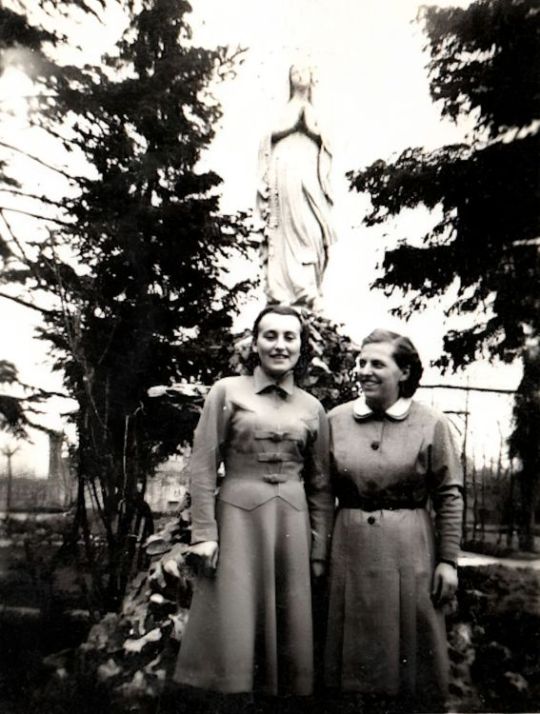
Innocenza and Lina Mompiano Brescia 1952 The three great mother divinities of the oriental peoples seem to have been both generative and annihilating; goddesses of life and fertility at the same time as goddesses of death. Sigmund Freud The Madonna is the essence of woman, she is the divine symbol of the mother par excellence, she is the spirit of life and love who endures and resists pain, suffering and death, to make the memory of her children immortal. Carl William Brown From now on I want to imagine death as a tender and affectionate mother who with extreme love, holding me smiling at her breast for all eternity, instead of giving me life will take it away from me. Carl William Brown In fact, complete happiness cannot silence the pain. Less than ever can the art that consoles, the technique that produces, the virtue that administers. Salvatore Natoli The maternal feeling is more directly satisfied than real motherhood, but it can find outlet in every child who needs a mother, in every creature who needs tenderness, care and an altruistic devotion driven to sacrifice in order to survive and grow. H. Deutsch Every man, without knowing it, seeks in a woman above all the memory of the time in which his mother hugged him. Marguerite Yourcenar
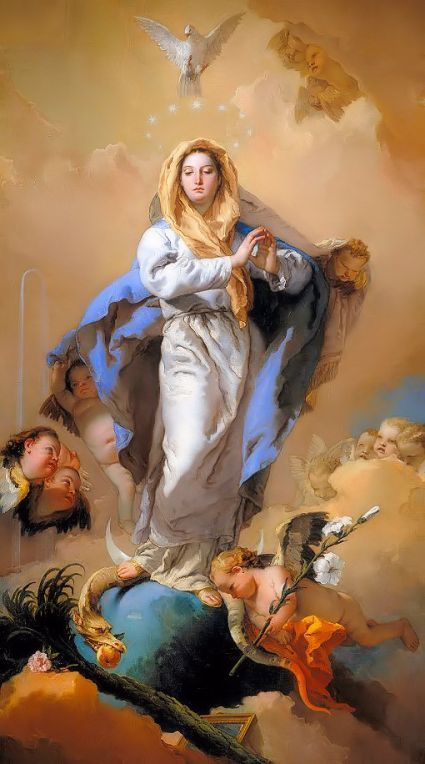
Blessed Holy Virgin I have never thought of anything other than doing my duty, praying and trusting in Our Lady. Don Bosco We have an infinite desire for love, for understanding, for trust, for beauty, for joy, for peace. We are so tired of this world which from every side, with its wickedness, assails us and disturbs us. Enrico Medi In every danger invoke Mary and I assure you that you will be heard. Don Bosco Holy Mary, Mother of God, preserve for me a child's heart, pure and transparent like a spring. Father Leonzio de Grandmaison If the winds of temptation arise, if you go against the rocks of tribulations, look at the star, invoke Mary! Saint Bernard The Mother of God is our Mother. The Mother of the one in whom we hope is our Mother. the Mother of the one who alone can save is our Mother. Saint Anselm of Aosta Jesus, Son of God, I beg you: for the infinite love you bring to your mother, allow me to love her as you love her and want her to be loved. Saint Anselm of Aosta
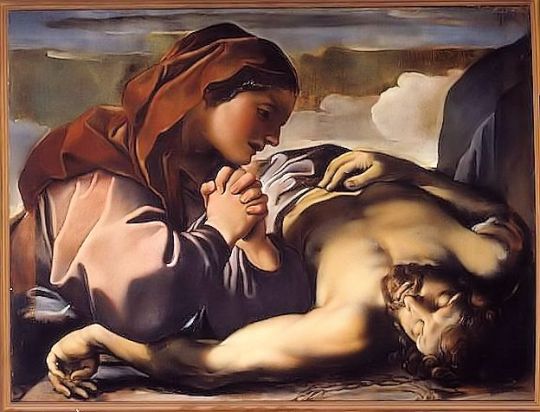
The Holy Virgin and Jesus The Madonna is the sacred character most "seen" or "heard" by ordinary people, more than God and Jesus. She is therefore a somewhat cumbersome figure for the Church, and which according to many anthropologists reflects the need to reaffirm a religiosity feminine, like those linked to fertility and the land which were on the scene in Europe for thousands of years before Christianity. Ave Maria. With more than a thousand shrines in Italy alone, Mary is the most popular female figure in the world: there is no country today that does not have an institute or association dedicated to her. After having gone from the status of a simple Palestinian girl from Galilee, in the zero year of our era, to the icon of the supreme mother in the Divine Comedy, from Michelangelo's Pietà, to the coat of arms of Pope John Paul II, where her initial stands out, "M". Here's the story. The Hero is nothing more than a special character born from the union of a god or goddess with a human being. He/She is an ingenious intermediate being between gods and men appointed to intervene in the world with exceptional deeds. The hero knows how to struggle with extreme courage and generosity, and for reasons or ideals deemed extremely valid and righteous he can even lead to the sacrifice of himself, because he is aware that his deeds will continue to feed the myth, the story, and the narrative literature in the future. The origin of this story dates back from a few years ago, but perhaps we could better say that it begins at the dawn of Christianity and maybe also a lot of time before. However we are in 1992 when a strange woman contacts an even more mysterious character. The two did not know each other and the reason for their meeting is a language consultancy that the unusual and curious lady requires to the young and odd scholar whose name is not even known to her. Everything is resolved in a week and gives rise to some translations in various languages of a small booklet of prayers that relate to a poor country seer who has witnessed several times to the Holy Virgin Mary's apparitions.
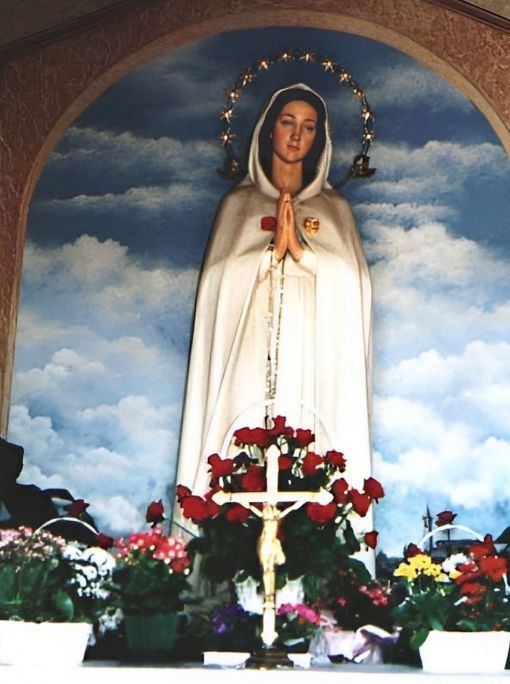
The Holy Virgin Rosa Mystica So our atheist translator does the indirect knowledge of Mrs. Pierina Gilli, the Holy Virgin Rosa Mystica and a place about twenty kilometers from his home, the Fontanelle in Montichiari, on the outskirts of Brescia. Eight years later in a July temperate day our hero finally finds himself with his mother in the attractive resort and he is inexplicably so deeply impressed that he can also have a short conversation with the Blessed Virgin Mary in person, who, however, does not say even a word. It may seem absurd at all to everyone, but not to our strange and surreal writer who has ever since been reborn more than once, and now he makes himself call Mr. Carl William Brown, that is the founder of the Daimon Club! The text of the communication is short, sharp, terse, concise, evocative. The receiver does hear nothing but these words: "Dear friend, you are an atheist, but you're more religious than a mystic and that's why I want you to criticize the power of stupidity in this world." Then she continued: "I am the mother of mankind, which becomes more and more absurd and selfish and always forgets more often to follow the Christian message. Now I want you to communicate my verb and in return I will help you in your struggle against the power and authority of banality. Our voices will rise up high in the sky, in the myth, in the story, both in joy and in suffering. You know perfectly well that religion is nothing but literature and life is nothing but art, that's why everyone must be able to communicate, and everybody should be able to know the truth against any kind of intolerance. So considering that you have always studied and read the sacred works, you may have the right, even if you do not believe, to be able to have your say. Therefore go and reveal my words and they will be stupid, selfish and intolerant those who do not divulge yours ideas, thoughts and criticisms ... "
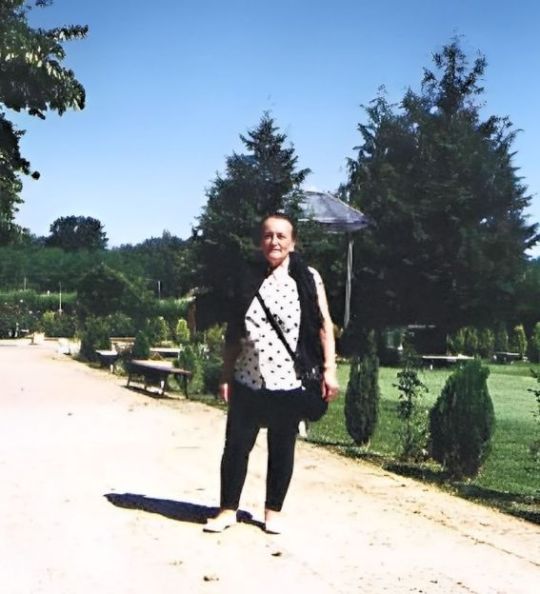
Innocenza at the Fontanelle Sanctuary As a matter of fact our hero was a bit dazzled by the brilliant intuition but he also felt himself invested with a secular mission and seized by a strange and subdued excitement, after this visit to the charming good place he went away almost pleased. The fascinating story ends here for the time being, because its protagonists do not want to go further. Their paths are split and their adventures are becoming increasingly more strange, but there remain several and different things they have in common, and they are the myth, the story, the mystery, the visions, the suffering, the pain, the meditation, the reflection, the peace, the struggle and the desire for a happier life. In this our actors are not so different and that's why our hero is preparing to make his most complete, devoted and sincere tribute to Our Lady Rosa Mystica of Fontanelle and to his beloved clairvoyant, Pierina Gilli from Montichiari. For more information, any clarification and guidance material you are advised to contact the official website of the Sanctuary of Our Lady Rosa Mystica in Montichiari, since on 7 December 2019, the Roman Catholic Diocese of Brescia inaugurated a shrine to the Blessed Virgin under the title Rosa Mystica – Mother of the Church. The sanctuary is a response to the claims of Pierina Gilli who reported Marian apparitions in Montichiari and neighbouring Fontanelle, Italy, in 1947 and 1966. Whether or not the source was a genuine apparition of the Virgin Mary, Pierina actively promoted a devotion to Our Lady with three roses upon her breast and a way of practicing devotion to Mary under the title "Rosa Mystica". Rosa Mystica (or Mystical Rose) is a poetic title of Mary. One form of Marian devotion is invoking Virgin Mary's prayers by calling upon her using a litany of diverse titles, and the title 'Mystical Rose' is found in the Litany of Loreto. It is also a Catholic title of Our Lady based on the Marian apparitions reported between 1947 and 1966 by Pierina Gilli at Montichiari and Fontanelle, in Italy.
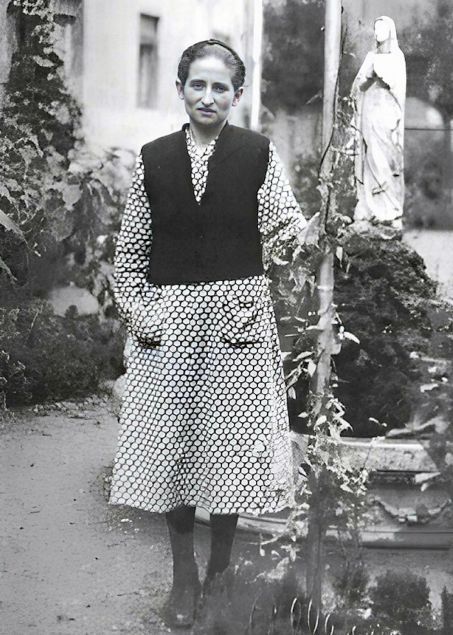
Pierina Gilli Italian visionary The Biblical source of the title is Song of Songs 2:1, often translated, "I am the Rose of Sharon". Bishop Robert C. Morlino draws a connection to Isaiah 11:1, "But a shoot shall sprout from the stump of Jesse, and from his roots a bud shall blossom. This is also reflected in the German Advent hymn Es ist ein Ros entsprungen, known in English as ""Lo, how a rose e'er blooming", which makes reference to the Old Testament prophecies of Isaiah which in Christian interpretation foretell the Incarnation of Christ, and to the Tree of Jesse, a traditional symbol of the lineage of Jesus. The statue of Virgin Mary under the title of Mystical Rose enshrined within the chapel of Montichiari-Fontanelle (Italy) apparitions Location Montichiari and Fontanelle (Italy) Date 1947–1966 Witness Pierina Gilli Type Marian apparition Shrine Sanctuary of Mystical Rose – Mother of the Church Attributes The Blessed Virgin Mary featuring three swords, or three roses in red, white and yellow. Feast day July 13 (feast day) December 8 (at noon, the so-called "Hour of Universal Grace") THE GREAT MESSAGE As at Fatima, after the vision of Hell, She has taught: "Oh Jesus, forgive our sins, preserve us... etc." and She wanted to establish The Devotion to His Immaculate Heart, in the same way now, on 13th of every month She is recalled so that She may be lived and consacrated for the Mystical Body, Christ's limbs, of whom Maria Rosa Mistica is the Mother. In the morning, at half past five, on 13th July The Holy Vergin appeared among a very shining light: a very beautiful Lady, dressed in a white satin dress with silver reflections: She had a white mantle as well fixed under the chin coming down till her feet, allowing to see some small light brown forlock. The mantle's border was finely embroidered in Gold. The Holy Virgin opened her arms and with them the mantle: instead of the three swords she showed on Her chest three Roses: WHITE - RED - GOLDEN-JELLOW.

The Blessed Holy Virgin Mystic Rose At her right arm She had a beautiful Rosary ending with a stupendous medal. Meanwhile Pierina Gilli was down on her knees in ecstasy, near the nuns with whom She had prayed, and the Celestial Lady with a sweet smile like this spoke: I am the Mother of all of you. Our God send me in order to bring a NEW MARIAN VOCATION in all the Institutes and Religious Congragations and also to the Secular Priests. I promise to all these Institutes and Congregations that most honour me that they will be protected: they will have many more Vocations, less souls that offend the Lord with mortal sins, less Vocations betrayed and sanctity in the Ministers of God. I wish the 13th day of the month to become a MARIAN DAY, to which 12 days of special prayers must be preceded. Such a day must be of REPARATION and must be for all the wrongs did against Our Lord. Such day is to be sanctified with particular prayers, among which the HOLY MASS, The St. ROSARY, the HOUR OF ADORATION. I would like the 13 July of every year to be celebrated in honour of Maria Rosa Mystica, especially inside the Institutes. In such a day, She continued with a joyful expression, I am going to make descend upon the Institutes and Religious Congragations, that would have honoured me, abundance of Graces and Sanctity of Vocations. On 22th October 1947 - after the miracle of blood, issued forth from the Crucifix upon the St. Purificator - she added: "I'm acting as a Mediatress among the human kind and most of all for the Religious Souls, since my Holy Son, tired of receiving continuous offences, wanted to exercise His Justice. I ensure my Protection for a living awakening of Faith and to let the selected Souls come back to the original spirit of their Holy Founders." You can also visit: Sanctuary of Our Lady Rosa Mystica Mamma, morte e memoria Halloween e la festa dei morti Madonne, madri e letterati Letteratura, religione, morti e psicologia Read the full article
#Alighieri#apparitions#AveMaria#Blessed#Bonazza#Brescia#Catholic#Christianity#church#Creator#Dante#DonBosco#Enrico#faith#Fontanelle#Freud#ImmaculateConception#Innocenza#Italy#Laffranchi#Lina#love#Lucia#Madonna#Mary#Michelangelo#Montichiari#mother#motherhood#Mystica
0 notes
Text

FLP CHAPBOOK OF THE DAY: Displaced Dolls and Oviducts by Marigo J. Stathis
On SALE now! Pre-order Price Guarantee: https://www.finishinglinepress.com/product/displaced-dolls-and-oviducts-by-marigo-j-stathis/
Displaced Dolls and Oviducts is a heartrending collection of #verse that speaks to the modern’s #woman’s authentic experience, covering ground from the whimsical and mythically virtuous to the solemn and appallingly foul. Deftly woven together are fabrics of topical issues related to vanity, mental health, friendship, family, self-discovery, grief, trauma, survival, and acceptance. Whether from the perspective of a tattoo artist, assault victim, or stranger in a ladies’ room, poems as lyrics of raw truth serve as springboards for connection, celebration, and healing.
Cognitive neuroscientist by day, creative disrupter by night, Marigo Stathis weaponizes the written word to excavate the bones that #women, #families, and societies often bury. She thoroughly enjoys writing about the absurdity and irony of #life. Her work has appeared in 34th Parallel, Abbey, The Baltimore City Paper, The Baltimore Sun, Bear Creek Haiku, Facedown, FanStory, The Keeping Room c/o Minerva Rising Press, Lite Journal of Satire and Creativity, The Loch Raven Review, The Sometimes and several anthologies. Her first #poetry #chapbook, Displaced Dolls and Oviducts, will soon be published by The Finishing Line Press.
PRAISE FOR Displaced Dolls and Oviducts by Marigo J. Stathis
Marigo Stathis’ voice, from bleak and beautiful Baltimore, wakes up our “slapped dreams” stranded on the Ladies’ Room door. There is manna here in her poems for all writers, whether their instruments are pen and paper, copper wires, or gut strings. These compositions in Displaced Dolls and Oviducts conjure their own unique primal rhythm – musicians, take serious note.
–Tori Amos, Singer-songwriter, Composer, Recording Artist
Displaced Dolls and Oviducts takes us on a curated tour through the female soul- branded, cracked, intricately folded, defiantly laughing, and secretly linked up to all the other female souls. The impressions remind me of those bygone instamatic snapshots we shove aside in boxes for years, then stare at for hours with wonder. Evocative work from a wise and compassionate writer.
–Ilya Chaiken, American Film Director, Producer, and Screenwriter, Liberty Kid, The Unlovables, and Margarita Happy Hour
Marigo Stathis’ poems bring us a world informed by her formidable intelligence, rich imagination, and deep heart. To read her work is to feel renewed.
–Nikia Leopold, Art Historian, Author, Poet, Healing with Shadows
Displaced Dolls and Oviducts invites us into the poignant, often difficult world of girls and women who struggle on the “female warrior’s path to self-worth and discovery.” With lyric intelligence, compassion, and humor, these poems bear witness to the complexities of female experience and celebrate feminine quests and rites. To read this collection is to enter into poetic rhythms that pulse like “things of beauty, / with contused cores— / injured fragments, / human origami.” Yet ultimately these poems give hope: “Remember the wings,” the poet admonishes us.
–Marguerite A. Tassi, Professor of Renaissance Literature and Shakespeare,University of Nebraska
Marigo Stathis’ writing is richly thematic, raining clemency on the reader with tight-toned music of compassion and solicitude. There is something more about the splendid collection, splendidly arranged, than can be known: art compresses nature, poetry suffers with the sufferer, or allows the sufferer to suffer with it; perhaps it does so as nothing else can if it doesn’t – and thereby liberates, if just a little.
–Eric Stull, Adjunct Professor of Language, Literature, and Cultural Studies, Bowie State University
Please share/please repost #flpauthor #preorder #AwesomeCoverArt #poetry #chapbook #read #poems #women
0 notes
Text
The Cook Family, 1341-1345

Family portrait painted winter 1842 by Martha Cook
Births: Isabela Benali (1343), Emanuel and Kareem Benali (1344)
Deaths: Polo Herrera (infection, 1341), Isabela Benali (stillborn, 1342) Adleida Cook (food poisoning, 1342) Geoffrey Cook (lightning, 1342), Emanuel Benali (stillborn, 1344), Kareem Benali (unknown, 1345) Matias Herrera II (drowned, 1345)
Marriages: Sofia and Salim Benali (1342)
1341

Theophania turns thirteen in the spring.

Tragically, her father Polo passes away in the summer due to an infected wound. With their parents dead and their mothers' siblings all too busy to take in four children, Theophania, Sofia, and the twins sail to Castille to stay with their paternal uncle Christopher.

Later in the fall, Eliza and Hamish also celebrate their thirteenth birthday.

Alexei's blacksmith apprenticeship is progressing well, but the work is long and hard - every day Alexei arrives home filthy and exhausted and heads straight to bed.
1342

Rejoice! Benedict has survived the war and returns home to his family. Changed forever by the things he saw and did,he is overjoyed to meet his new son and to try and return to a sense of normalcy.


He and Ivana spend their first night back together the way a husband and wife often do. While she is overjoyed her beloved has come home, the thought of going through another pregnancy worries her.

Life returns to normal for the Cooks; but occasionally, after her husband has gone to bed, Ivana creeps downstairs to spend a night with Martha.


Sofia reaches adulthood in the summer. She is settling in well to her new life in Castille - she has even caught the eye of a certain bachelor, a scholar from Granada named Salim. The two are married in late August.

Unfortunately, Adleida dies in the autumn from an illness caused by eating old soup.

In a freak accident, Geoffrey is struck by lightning and killed in the winter. Too young to find spouses yet or live on their own, Eliza and Hamish write to their uncle Richard, who agrees to take them in at Castle Landgraab. He takes on Hamish as an apprentice - Richard has not found a wife or produced an heir, but his nephew would make a fine successor for the barony.
1343

Early in the year, Sofia and Salim welcome a child into the world; unfortunately, baby Isabela is stillborn.

Richard turns thirty in the spring. As with his twentieth, he holds a feast, but the guest list is much smaller ; he and Benedict are the only siblings left alive. Along with their undead sister and their brother's orphaned twins, they share a quiet meal.

In the fall, Benedict II turns six. He is a sickly and squeamish young boy, and prefers the company of books and chesspieces to dirt and animals.
1344



Godwin is growing up quickly; he and his brother Alexei are the terror of the town. Both brothers are rivaling for the affection of Leah, the daughter of the local cheesemonger.

In the winter, Sofia gives birth again to twin boys. Emanuel is stillborn, but Kareem is a healthy baby; the first of generation four to survive birth.

Sadly, he passes away weeks later.
1345


Eva and Julia celebrate their thirteenth birthday in the winter; they are growing into bright and confident young ladies.



Far off in Castille, their cousin Marguerite turns twenty. Her celebration is tinged with grief - weeks earlier, her twin Matias drowned in a lake on a drunken fishing trip gone wrong.



The past five years bring many questions for the future. Will generation four ever make it to childhood? Another recruitment campaign will begin for the war soon; will Benedict and Ivana be torn apart from each other again, either by war or by the secret between them? Which brother will win Leah's heart? To find out, we can only wait for the hands of time to turn...

0 notes
Photo

Charles Blavette and Celia Montalván in Toni (Jean Renoir, 1935) Cast: Charles Blavette, Celia Montalván, Édouard Delmont, Max Dalban, Jenny Hélia, Michael Kovachevitch, Gabi. Screenplay: Jean Renoir, Jacques Levert. Cinematography: Claude Renoir. Production design: Leon Bourrely. Film editing: Suzanne de Troeye, Marguerite Renoir. Music: Paul Bozzi. Authenticity in movies is like sincerity in politics: If you can fake it, you've got it made. Jean Renoir's Toni is a venture into realism, the quest for the kind of authenticity produced by using non-professional actors and shooting on location without resort to studio-built sets. Like the films of the Italian neorealist directors who admired and imitated Toni, it focuses on the struggles of the working class, in this case the immigrant workers from Spain, Italy, and North Africa who come to the South of France seeking jobs on the farms and, in the case of the Italian Antonio "Toni" Canova (Charles Blavette), the quarries. The film begins with Toni's arrival on a train; as the workers spread out on their search, we follow Toni as he knocks on the door of a boarding house run by Marie (Jenny Hélia). Then there's an abrupt cut in which time has passed and we see that Toni is now sharing Marie's bed. It's a time jump that Renoir will use several times over the course of the film. While still with Marie, Toni falls in love with Josefa (Celia Montalván), a Spanish woman, but she agrees to marry the brutish Albert (Max Dalban), who is Toni's boss at the quarry. Toni proposes that he and Marie join them in a double wedding ceremony. After another time jump, Josefa has had a baby and named Toni as the godfather, a role that doesn't please Marie at all. As the marriage of Toni and Marie disintegrates, he moves out of the house and she attempts suicide. Eventually, the relationship of Toni and Josefa ends in calamity, and as the film ends we have a reprise of the opening scene: Another train arrives, with yet another group of laborers. Toni is, as we should expect from Renoir, a work of great cinematic sophistication used to create a sense of simple immediacy, of witnessing real lives unfold. The story, while often melodramatic, maintains its documentary quality by relying on ambient sound and the deglamorization of its players. The polyglot cast is utterly convincing, and for once the viewer reliant on subtitles may be at something of an advantage over those just listening to the dialogue: Even if you know only a little French you can tell that the accents are thick and varied. But the film is also often visually quite beautiful: It was the first collaboration of Renoir with his nephew, Claude, as cinematographer, who achieves some quite striking nighttime scenes without resorting to the filtered or underexposed daylight shooting known as "day for night" or, in France, la nuit américaine.
0 notes
Note
The anti fans tried to spin BE's cancellation as proof "no one" wanted shows about Elizabeth (and by extension Anne) anymore. Like antis are the voice of the people guys! The cry of the oppressed! Speaking truth to power! But BSR did ok afaik and so now it's "proof" that Anne's story is so tired they have to make it "trash" to sell it. So antis are claiming the "moral victory" on this one. Now they're a select few looking down on us. It's funny bc when The Tudors came out in 2007 it was also considered trash yet now is practically beloved and respected. And that was everyone's story sold as "trash".
Tudors was very trashy in some ways, yet I don't really like the way this one looks down on women that weren't 'intellectual' (arguably, do we even 'know' that, anyways?)...in a way it feels like three steps forward, one step back. We've charted a trajectory of Marguerite voiceless and objectified, Henry fucking her to 'get back' at François (Tudors S1) to Marguerite given a voice and lauded, but then...inexplicably, given a voyeuristic view into an orgy, several beats before that scene. Seemingly just because we can.
BSR has actually done pretty well, as far as I can tell? It was trending on UK Netflix a while ago (so much for this being done 'because of Americans', lol) The Spectator seems like it was a nose-holding Alison Weir, please tell us why Anne was cunty and not worth admiration puff piece, I don't even remember a rating, the Guardian gave it four stars, I believe on some other entertainment review websites it's been given a pretty consistent 4 star rating...at this point it has about the same rating on IMDb as Anne Boleyn (2021), but again, to assume social media reviews have anything to do with what is produced/picked up is ludicrous...AMC bought the rights to that show because enough people watched it to justify doing that. Numbers don't lie, but people do.
For this one, the thing is, they're still watching? Some COA stan on Insta that posted like a million stories about how the casting of a lovely, 42-year-old brunette woman as Catherine is the equivalent of spitting on her grave, watched it on Netflix. Most who have said they would not watch it, did. They hate Henry/Anne (and I don't believe they didn't know that was entirely what this show WAS...the marketing was not subtle) and/or Anne Boleyn as a genre, and now in part because of them, more content of that genre will be made. You gotta love the irony.
4 notes
·
View notes
Text
Don’t I Get a Dream for Myself ? – Bernadette Peters and the 'Gypsy' Saga
Gypsy. It’s perhaps the most daunting of all of the projects related to Bernadette Peters to try to grapple with and discuss. It’s also perhaps the most significant.
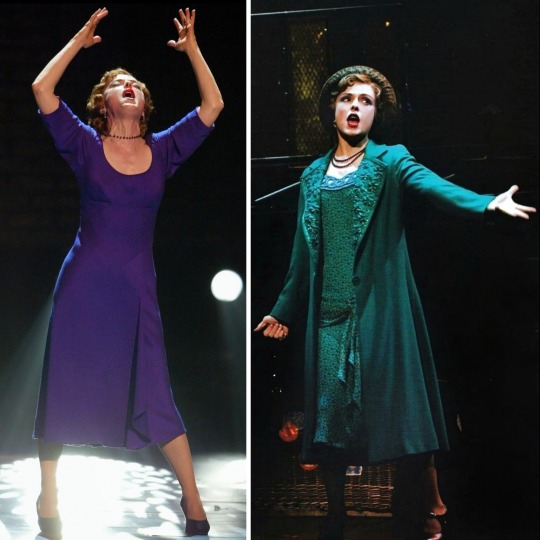
For someone notoriously guarded of her privacy and personal life, careful with her words, and selective of the questions she answers, the narrative around this show provides some of the most meaningful insights it is possible to derive in relation to Bernadette herself. The show’s ability to do this is unique, through the way it eerily parallels her own life and spans a large range in time from both Bernadette Peters the Broadway Legend, right back to where it all began with Bernadette Lazzara, the young Italian girl put into showbusiness by her mother.
The most logical place to start is at the very beginning – it is a very good place to start, after all.
(Though no one tell Gypsy this, if the fierce two-way battle with The Sound of Music at the 1960 Tony Awards is anything to be remembered. Anyway, I digress…)
Gypsy: A Musical Fable with music by Jule Styne, lyrics by Stephen Sondheim, and book by Arthur Laurents, burst into the world and onto the New York stage in May of 1959. After closing on Broadway in March 1961, Ethel Merman as the world’s original Mama Rose herself led the first national tour off almost immediately around the country. Just a few months later, a second national touring company was formed, starring Mitzi Green and then Mary McCarty as Rose, to cover more cities than the original. It is here that Bernadette comes in.
A 13-year-old Bernadette Peters found herself part of this show in her “first professional” on-the-road production, travelling across the country with her older sister, “Donna (who was also in the show), and their mother (who wasn’t)”.
The tour played through cities like Philadelphia, Chicago, New Haven, Baltimore and Las Vegas before closing in Ohio in 1962. Somewhat uncannily, its September 1961 opening night in Detroit’s Schubert Theatre even returns matters full circle to the 2003 revival and New York’s own Schubert Theatre.
Indeed this bus-and-truck tour was somewhat of a turning point for Bernadette. She’d later remember, “I mostly thought of performing as a hobby until I went on the road with Gypsy”.
But while this production seminally marked a notable moment for the young actress as well as the point where her long and consequential involvement with Gypsy begins, it’s important to recognise she was very much not yet the star of the show and then only a small part of a larger whole.
Bernadette was with the troupe as a member of the ensemble. She took on different positions in the company through the period of nearly a year that the show ran for, including billing as ‘Thelma’ (one of the Hollywood Blondes), ‘Hawaiian Girl’, and additional understudy credits for Agnes and Dainty June.
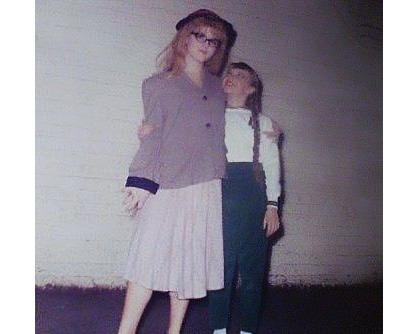
The above photo shows Bernadette (left) with another member of the ensemble (Sharon McCartin) backstage at the Chicago Opera House as one of the stops along the tour. Her comment on the stage of the Chicago theatre – “I’d never seen anything so big in my life!” – undeniably conveys how her experiences were new and appreciably daunting.
Along the tour, she assumed centre-stage once or twice as the understudy for Dainty June, but playing the young star was not her main role. Unlike what more dominant memory of the story seems to purport.
Main credits of June went instead to Susie Martin – a name and a tale of truth-bending that’s now well-known from Bernadette’s concert anecdotes. While performing her solo shows as an adult and singing from Gypsy, Bernadette has often been known to take a moment to penitently atone for historical indiscretions of identity theft or erasure where her mother long ago conveniently left out the “understudy” descriptive when putting down Dainty June on her resumé, in an effort to add weight to the teenager’s list of credits.
Whatever happened to Susie Martin? – many have wondered. Well, she soon left the theatre. But not before appearing in two more regional productions of Gypsy and a 1963 Off-Broadway revival of Best Foot Forward with Liza Minnelli and Christopher Walken.
Bernadette too went on to other regional productions of Gypsy. She spent the summer of 1962 in various summer stock stagings with The Kenley Players, like in Pennsylvania and Ohio, and this time she did indeed get to play June.
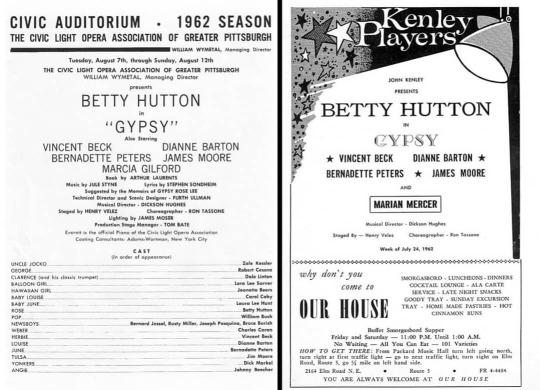
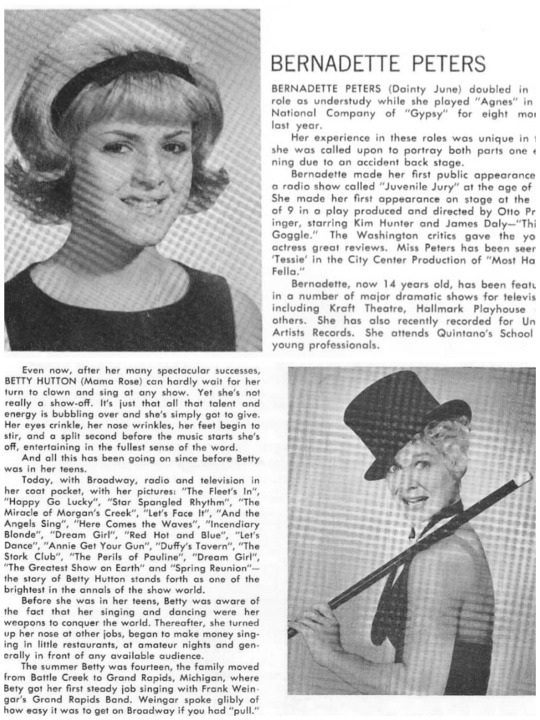
Above shows photos from different programmes for these productions. While some may have featured odd forms of photo editing, they at least also bring to attention Rose here being played by none other than Betty Hutton.
The two women couldn’t have been in more different positions when they coalesced in these rough-around-the-edges, small-scale productions. A young Bernadette was broaching summer stock in starting to take on bigger roles in the ascendency to her bright and long career. Meanwhile, Betty found herself there while navigating the descent that followed her sharp but fickle rise to Hollywood fame in the ‘40s and early ‘50s. Top billing Monday, Tuesday you really are touring in stock after all.
While details aren’t plentiful for these productions, it was recounted Betty apparently struggled in performing the role. And understandably so. Following the recent traumatic death of her mother in a house fire, and the birth of her third child shortly before the shows began, it’s not hard to see why her mind might have been elsewhere. Still, she was apparently impressed enough by the younger actress who turned in one of the show’s “creditable performances” to make comment that she would’ve liked Bernadette to play her if a movie were made about her life.
Bernadette might not have done this exactly, but she did go on to revitalise Betty’s best-known movie role, when stepping into Annie Oakley’s shoes in the 1999 Annie Get Your Gun revival. With Bernadette’s first Ethel Merman show under her belt, the ball was soon rolling on her second.
The 2003 production of Gypsy was imminently beckoning as her next successive Broadway musical and it was Arthur Laurents who lit the match to spark Bernadette’s involvement. Laurents, as the show’s original librettist, drove the revival by saying he “didn’t want to see the same Rose” he’d seen before. Going back to June Havoc’s description of her mother as “small” and a “mankiller”, and Arthur’s take that Bernadette sung the part “with more nuance for the lyrics and the character than the others”, the choice of Bernadette was justified. Moreover, “Laurents – whose idea it was to hire her – [said] going against type is exactly the point,” and Sam Mendes, as director, qualified “the tradition of battle axes in that role has been explored”.
So Bernadette also had her own baseline of innate physical similarity to the original Rose Hovick, in addition to her own first-hand memories of the women she’d acted alongside as Rose in her youth to bring into her characterisation of the infamous stage mother.
But there was a third factor beyond those as well to be considered in the personal material she had access to draw from for her characterisation. Namely, her own real life stage mother.
Marguerite Lazzara did share traits with the character of Rose. She too helped herself to silverware from restaurants, and put her daughters in showbusiness for the vicarious thrill. Marguerite had “always wanted to become an actress herself”, but had long been denied her desire by her own mother, who likened actresses to being as “close to a whore as you could be without, you know, getting on your back”.
In that case, to “escape a housewife’s dreary fate in Ozone Park”, Marguerite channelled her latent dream through her pair of young daughters instead, shepherding them out along the road. Thus was produced a trio of the two children ushered around the theatre circuit by the driven mother, forming an undeniable parallelism and a mirror image of both Bernadette’s reality and Gypsy’s core itself. Bernadette didn’t see some of these familial parallels at the time when she was a child, considering “maybe I didn’t want to see” – “didn’t want to see a mother doing that to her daughter”.
It was coming back to the show as an adult that helped Bernadette resolve who her mother was and some of the motivations that had propelled her when Bernadette was still a child. She realised, “I think she thought she was going to die very young”, as her own father died young. So “she was rushing around to get as much of her life as she could in there”.
When she herself returned to the production in playing Rose, Bernadette conceded to sometimes bringing elements of her mother and her driven energy into her portrayal, and admitted too she looked “like her a lot in the role”. You can assess any familial resemblances for yourself, from the images below that show a young Marguerite next to Bernadette in costume as Rose, and then with the pair backstage in 1961 in a dressing room on the tour.
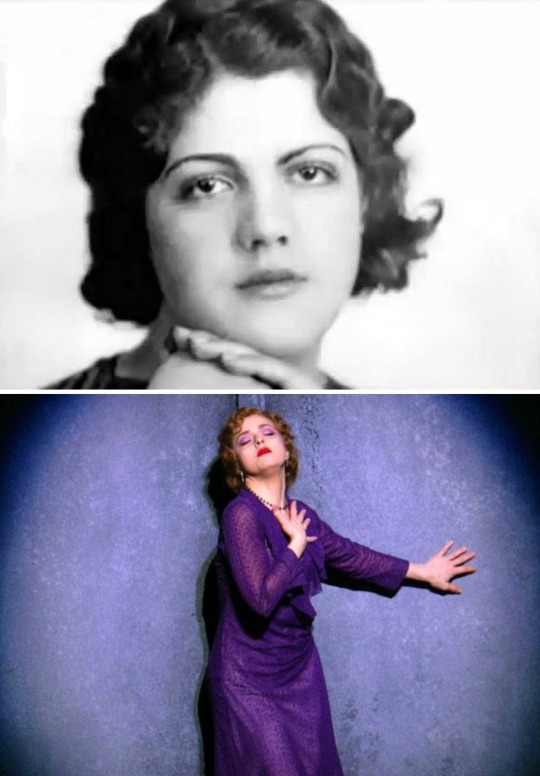
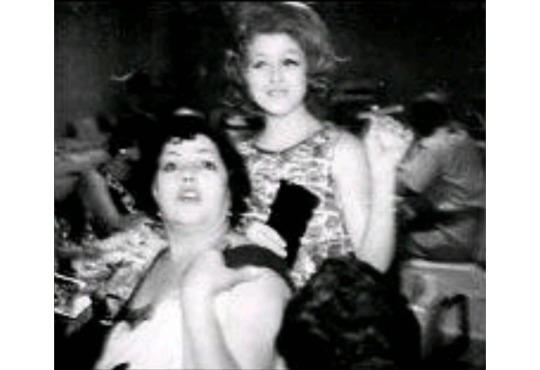
Marguerite was ambitious. From her own personal position and with the restrictions imposed upon her, it was ambition that materialised through her children. Irrevocably, she altered them. She placed Bernadette on TV as a very young child (“I was four when my mother put me in the business”); changed her daughter’s surname (“She told me my real name was too long for the marquees,” or really – “too Italian”); doctored her resumé (“Somehow the word ‘understudy’ vanished. ‘No one will know,’ said Marguerite”); and lightened her hair (“She’d say, ‘Oh, I’m just putting a little conditioner on it.’ But slowly my hair got blonder and blonder!”). All in the hope of giving her child a more favourable chance at the life she’d always wanted for herself.
On paper, a classic stage mother. “When I was a kid, she fulfilled herself through me,” Bernadette would say. “She put me into show business so she could get a taste of the life herself.”
But it’s important to consider Bernadette often qualifies that her mother wasn’t as brutal as Rose, nor was she herself as traumatised as June.
Bernadette didn’t begrudge her mother for her choices – at least by the time she was an adult, she’d rationalised them, explaining “naturally it was more exciting [for her] to go on the road with me than staying home and keeping house”.
As a child, Bernadette hadn’t necessarily wanted to be on stage, but there was a sense of ambivalence – not resentful belligerence – as she “didn’t care one way or the other” when she found herself there.
Like June, Bernadette may have been entered into and coaxed around a path she hadn’t voluntarily chosen. But unlike June, Bernadette had a deal with her mother that “she had only to say the word”, and she could leave.
Most crucially, she never did.
But that’s not to say Bernadette was enamoured with acting from the beginning.
She seemed to feel ‘outside’ of that world and those in it. And others saw it too.
It was in 1961 in Gypsy that Bernadette first met Marvin Laird – her long-time accompanist, conductor and arranger. The way he put it, he “noticed this one young girl, very close with her mother” who, during breaks, “didn’t mix much with the other girls”.
Beneath the effervescent stage persona, there’s a quieter and more reserved reality, and a sense of separation and solitary division.
When asked by Jesse Green in 2003 for the extensive profile in The New York Times if she thought her experiences on the road in Gypsy were good for her at that age, she gives a curious, somewhat abstract, predominantly dark, potentially macabre, response. He wrote:
She doesn’t answer at first but seems to scan an image bank just behind her eyes for something to lock onto. Eventually she comes out with a seeming non sequitur. “I didn’t know how to swim. I remember, in Las Vegas, I fell in, once, and they thought I was flailing, but I felt like: ‘It’s pretty down here!’ I might have been dying and I was thinking: ‘Look at the pretty color!’ And suddenly my fear of water was gone, and I could have stayed in forever.” After a while, I realize she’s answered my question. Then she dismisses the image: “But I had to get my hair dry for the show that day, so up I came.”
I’m still not entirely sure I know what she’s trying to convey here. My interpretation of this anecdote changes as I have re-visited and re-examined it on multiple occasions at different time points. It’s arguably multiply polysemic.
Was she simply swept up in a moment of childlike distraction, lost in the temporary respite alone away from the usual noise and clamour? Was she indicating comprehension that her feelings and perspectives came secondary to any practical necessities and inevitable responsibilities? Was she using the water to depict a muffling and fishbowl-like detachment from others her age who got to live more ‘ordinary’ lives in the ‘normal’ world above that she felt separate from? Was she referencing the pretty colours she saw as a metaphor for show business and how she became bewitched by them even despite potential dangers? Was she trying to legitimately drown herself, or at least exhibiting an ambivalence again as to whether she lived or died, because of what the highly pressurised demands on her felt like?
The underlying sentiment through her response in answer to Green’s primary question was that, in essence – no. Being a child actor was not “over all, a good experience for a youngster”.
Acting might have been something she fell in love with over time, but not all at once, not right from the beginning, and not without noting its perils.
It was a matter of accidental circumstance that landed Bernadette in the show business world to begin with at such a young age in the first place – “I just found myself here,” she would offer.
Her mother, who was “always crazy about the stage”, “insisted” that her sister, Donna take lessons in singing, dancing and acting.
A further point of interest to note is that, although it was Bernadette with her new surname who would grow up to be the famous actress, look to the cast lists from the 1961 touring production of Gypsy that featured both sisters in the company (see photo below) and you’ll find no ‘Lazzara’ in sight. Donna too, appearing under the novel moniker of “Donna Forbes”, had also already become stagified (nay, ethnically neutralised?) by her mother. As such it is clearly demonstrated that Marguerite’s intention at that point was to make stars of both her daughters. Correspondingly so, when her sister returned from her performance lessons some years before, “Donna would come home and teach me what she had learned,” Bernadette remembered. She may have gotten her “training second hand”, but the key element was that she got it.
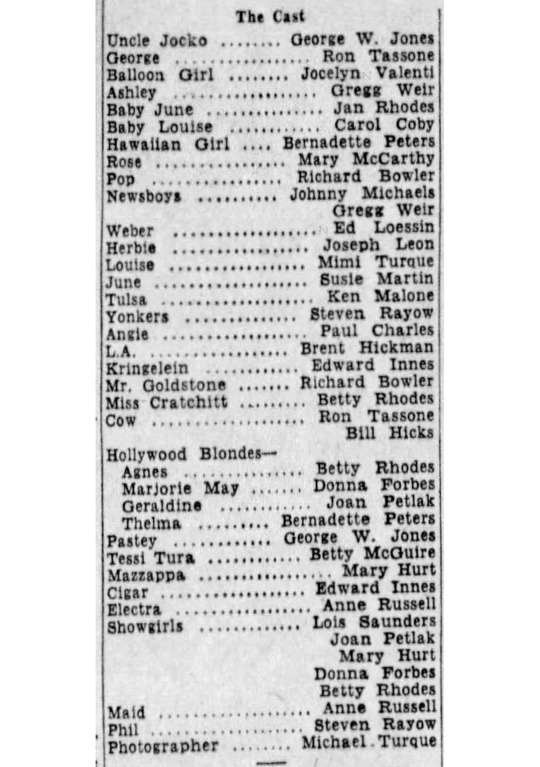
For Bernadette, it was a short jump from emulating magpied tricks from her sister as well as routines from Golden Age Busby Berkeley musicals on the ‘Million Dollar Movie’ in front of the TV screen, to her mother getting her on the other side of the screen and actually performing on TV itself – belting out Sophie Tucker impressions aged five for all the nation to see.
The photos below show Bernadette in performative situations at a young age (look for criss-crossed laces in the second for identification).
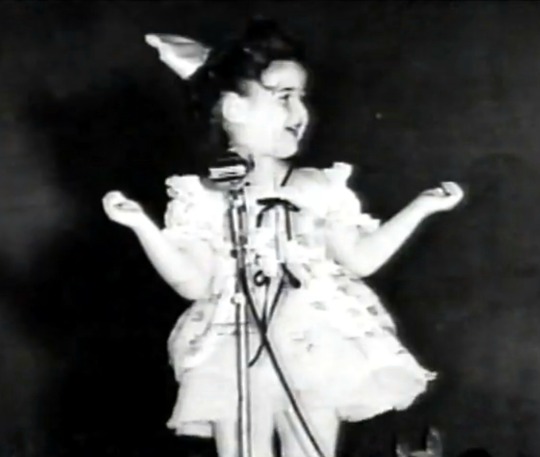
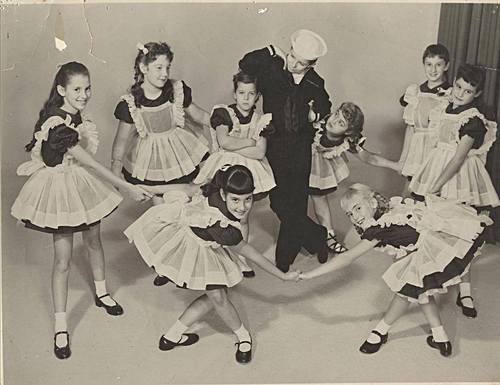
“At first, as a toddler, Bernadette enjoyed performing; it came naturally, a form of play that people inexplicably liked to watch.” It was “just a hobby” and she “wanted to do it”.
But while she may not have detested it, she didn’t entirely comprehend what was going on either. “I didn’t even know I was on TV,” she said. “I didn’t know that those big gadgets pointed at me were cameras and that they had anything to do with what people saw on the television set.”
When she started gaining more of an awareness of how “such play [was being] co-opted for commercial purposes”, she grew less enthralled. “She didn’t care for the bizarre children, accompanied by desperate mothers, she began to see at auditions: ‘They spent their whole time smiling for no reason, you know?’”
Being a child who had become sentient of being a child performer began to grow wearisome and grating to the young girl who had her equity card, a professional (and strange, new) stage name, and an increasingly long list of expectations by the time she was nine. There’s a keen sense she did not enjoy being in such a position: “I wouldn’t want to be a child again. When you’re a child, you have thoughts, but nobody listens to you. Nobody has any respect for you”.
Gypsy did indeed mark a turning point for Bernadette as mentioned above – but not just in the way that seems obvious. Looking back at it now, it does appear the monumental turning point at which she started appearing in significant and reputable productions, beginning what would be the foundation to her ‘professional’ career. However it was also the turning point after which she nearly quit the business altogether.
When she returned from performing in Gypsy, Bernadette felt like she’d had enough. One way of putting it was that she “then retired from the business to attend high school”, wanting to have some semblance of a normal scholastic experience “without the interruptions”. But whatever dissatisfaction she was feeling as an early adolescent on stage, she didn’t resolve at school – going as far as saying that while at Quintano’s School for Young Professionals, “she was in pain”.
“When you’re a teenager you’re too aware of yourself,” she recalled. Being a teen and trying to come to terms with of the expectation of the ‘60s that “you are supposed to look like Twiggy, and you don’t, you feel everything is wrong about you”. Everything “was all about tall, skinny, no chest…[and] hair straight”. Little Bernadette with her “mass of [curly] hair and distracting bosom”, as Alex Witchel put it, was never going to fit that mould. “That was not me,” she stated. “At all.”
Her self-consciousness grew to the point that it became overwhelming and asphyxiating. “I was trying desperately to blend in and be normal, but that doesn’t allow creativity to come out,” Bernadette said. “I knew I was acting terrible. The words were sticking in my mouth and all I could think about was how I looked”. It was hard enough just to look at herself (“I didn’t like what I saw in the mirror”), let alone to have other people gawk at her on stage. So she stopped trying. She “didn’t work much from age 13 to 17” in the slightest. Bernadette would later reflect in 1981 in an atypically open and vulnerable interview, “I was very insecure. Insecurity is poison. It’s like wearing chains”.
It was a combination of factors that helped her overcome these feelings of such toxic and weighty burden to draw her back into the public world of performing and the stage. “The two people who helped her most, she says, were David LeGrant, her first acting teacher, and her vocal coach, Jim Gregory.” Jim helped with “[opening] a whole creative world for [her] with singing”; and it was David who’d give her the now infamous and often (mis)quoted line about individuality and being yourself.
Having these kinds of lessons, she reasoned, was “really a wonderful emotional outlet for a kid of 17”. The process of it all was beneficial for her therapeutically – “you have a lot of emotions at that time in your life, and it was great to go to an acting class and use them up”. And Bernadette felt freer on stage than she did out on her own in the ‘real world’, saying “[up there] I don’t have to worry about what I’m doing or saying because I’m doing and saying what I’m supposed to be doing and saying”.
Finally then and with considerable bolstering and support, she grew comfortable with the notion of being visible on stage and in public, and realised she was never going to blend in as part of the chorus so it was simply better to let go of such a futile pursuit.
David LeGrant’s guiding advice to Bernadette (“You’ve got to be original, because if you’re like everyone else, what do they need you for?”) wasn’t just a trite aphorism. For her, it was a life raft. It was the key mental framing device that allowed her to comprehend for the first time that she might actually have intrinsic value as herself. And that it was imperative she let herself use it.
She had always stuck out, yes, but she had to learn how to want to be seen – talking of it as a conscious “choice” she had to make when realising she did “have something to offer”.
Thus soon after Bernadette graduated, she stepped back into productions like in summer stock and then Off-Broadway as she made her debut at that next theatrical level at 18. It wasn’t long before she was discovered in what’s seen as her big break in the unexpected smash hit, Dames at Sea. And so Bernadette Peters, the actress, was back. And she was back with impact and force.
Besides, as she’s also said, she couldn’t do anything else – “if I ever had to do something else to earn a living, I’d be at a total loss”. An aptitude test as a teenager told her so apparently, when she “got minus zero in everything except Theater Arts”. So that was that. Her answer for what she would’ve done if she’d never found acting is both paradoxically exultant and macabre – “I don’t know, probably shot myself!”
Flippant? Maybe. Trivial? No.
Acting is thus undoubtedly related highly to Bernadette’s sense of purpose and self-worth. This is what makes it even more apparent that a show with such personal and historical connections for her, as in Gypsy, was going to be so consequential and impactful to be a part of again as an adult and perform on a public stage.
She’s called inhabiting the role of Rose in the 2003 revival many things: “deeply personal”, “life changing”, “like going through therapy” – to name a few.
In interviews regarding Gypsy and playing the main character, when asked what she had learnt, Bernadette would frequently say something like, “It taught me a lot”. Pressed further about specifics, her answers often hem close to vague platitudes as she maintains her normal tendency of endeavouring to keep her privacy close to her chest.
On one occasion, she actually elaborated somewhat on what she’d learnt, giving a fuller answer than the question is normally afforded anyhow. Beyond all it revealed to her about her mother, she extended to admitting “my capacity for love and my capacity for anger” as aspects in her that the show had permanently altered. Moreover, Rose to her was undoubtedly the “most rewarding and fulfilling acting experience” she had ever had.
But while such deep, personal and emotional depths and memories were being stirred up beneath the surface in private, she was getting vilified in public singularly and repeatedly by New York Post columnist, Michael Riedel.
Even before she’d set foot on stage, Riedel set forth in motion early in the 2003 season a campaign of vocal and opinionated defamation against Bernadette as Rose that she was miscast, insufficiently talented, and would be incapable of executing the role.
Too small, too delicate, too weak, too many curves (and too much knowledge of how to use them). Not bold enough, not loud enough – not Merman enough. Chatter and speculative dissent begun to grow in and around the Broadway theatres.
For such a prestigious and historic musical theatre role, it was always going to be hard to erase the large shadow of an original Merman mould. Ethel was woven into the very fabric of the show, with the rights to Gypsy Rose Lee’s memoirs being obtained at her behest in the first place, and the idiosyncrasies of her voice having been written into the songs themselves by their very authors.
To step out from such a domineering legacy would be a marked challenge at the best of times. Let alone when battling a respiratory infection.
Matters of public perception were certainly not helped when Bernadette then got ill as the show started its preview period and she started missing early performances.
Nor did it help with critical perception that the Tony voting period coincided so synchronously with Gypsy’s first opening months – giving Bernadette no time to recover, find her feet, and settle more healthily into the show for the rest of the run before the all important decisions were made by that omnipotent committee.
The tale of her illness is actually undercut by a more innocent and unsuspecting origin than you’d expect from all the drama and trouble it engendered. Bernadette decided nearing the show’s opening to treat herself to a manicure. In the salon, she was next to a woman very close to her with a frightful sounding cough. Who could’ve known then that this anonymous and inconspicuous lady through a fateful cause-and-event chain would go on to play such a part in what is among the biggest and most enduring Tony Awards “She was robbed!” discourses? Or even more broadly – in also arguably playing a hand in the closure and financial failure of an $8.5 million Broadway show after its disappointing performance at the Tony Awards that ominously “[spelled] trouble at the box office” and led to its premature demise?
Bernadette did not win the Best Actress in a Musical Tony that night on June 6th 2004. The award went instead (not un-controversially) to newcomer Marissa Jaret Winokur for Hairspray.
She did however give one of the most indelibly resonant and frequently re-referenced solo performances at the awards show just before she lost – defying detractors to comprehend how she could be unworthy of the accolade with a rendition of ‘Rose’s Turn’ that has apocryphally earned one of the longest standing ovations seen after such a performance even to date.
Even further and even more apocryphally, she reportedly did so while still under the weather as legend as circulated by musical theatre fans goes – performing “against doctor’s orders” with stories that have her being “afflicted with anything from a 103-degree fever, to pneumonia, to a collapsed lung”.
Seeing then as unfortunately there is no Tony Award speech to draw on here, matter shall be retrieved fittingly from that which she gave just a few years earlier in 1999 for her first win and previous Ethel Merman role in Annie Get Your Gun to wrap all of this together.
As has been illustrated, there are many arguably scary or alarming aspects in Bernadette’s Gypsy narrative. There’s undeniably much darkness and an ardent clamouring for meaning and self-realisation along the road that tracks her journey parallel to the show. But unlike Rose’s hopeless decries of “Why did I do it?” and “What did it get me?”, there was a point for Bernadette.
As her emotional tribute in 1999 went: “I want to thank my mother, who 48 years ago put me in showbusiness. And I want to finally, officially, say to her – thank you. For giving me this wonderful experience and this journey.”
Whatever all of this was, maybe it was worth it after all.
#bernadette peters#gypsy#gypsymusical#gypsy the musical#stephen sondheim#arthur laurents#jule styne#ethel merman#broadway#musical theatre#musicals#broadway history#annie get your gun#betty hutton#tony awards#gypsy rose lee#sam mendes#new york#musical#musical theater#broadway musicals#the sound of music#summer stock#liza minnelli#stage mother#child actress
72 notes
·
View notes
Text
Queen B 2, Ch. 5 AKA Role Model
What happened this week:
Your next cult challenge is a fashion show, where the industry professionals are miffed about your existence. Luckily, there’s a bigger bitch in town, in the form of Bloodbound’s very own Nicole Anderson, and since your saviour complex is never satisfied, you, well, rally the lesser models against her and are hailed as the hero of the show.
Zoey offers her support from her producer internship, bored out her mind, where she’s been running coffee and errands just as any new intern would. Trust me, been there, done all of that. It is as dreary as it sounds, but not as dreary as the desperate caller who keeps interrupting your conversation. Turns out it’s Professor Clingy themself.
Kingsley is in a fuss over your well being, despite your constant reassurances that you’re perfectly fine and nobody means anything to you. They say they have evidence of X plotting against you, but it’s just screenshots of some all-talk Discord users. Clearly this archaic boomer has never opened the internet ever in their life. Not even Facebook, where forums like this are the site’s hottest thing. I heard the Specialized Baked Goods groupchats have been popping off lately. Anyways, fuck them, literally, in another diamond scene, complete with another CG.
Another post from the T rolls in, this time accusing you of being involved with drugs somehow, and barely five minutes later, an email from Dean Steinhelm, who’s taken this at face value and is now requesting you in her office.
Thoughts:
A pretty stale chapter overall, but I guess you win some, you lose some. There’s only so much you can do to prove your worth to the entire school after the events of Book 1, in which you proved your worth to the entire school. X is all talk and hasn’t actually done anything substantial to you yet, save for the pathetic professor pics, but really, X is another inconvenient internet troll.
“Zero-tolerance policy as it pertains to recreational drug use.” Marguerite, you’re the dean of an elite, rich-people school. I am one-hundred percent confident that people are buying and doing drugs in the middle of the quad right where you can see them. Daddy’s money can do a lot of things. This, combined with the fact that Steinhelm is ready to jump your ass every time X pulls a bigger move makes it awfully suspicious. Not even subtle at this point.
17 notes
·
View notes
Text
“Plenty of women spoke out against rape in the Middle Ages, though just like now, they had to struggle to be heard. Medieval courts often let rapists go with little explanation and placed the burden of proof on the victim, as demonstrated by several cases in this register from 14th century Paris. In one instance, chambermaid Eudelot la Picarde accused her employer Guillaume Damours of raping her, and the court tasked her with producing witnesses, to which she responded that there were none. La Picarde failed to appear in court at the next date (perhaps because she knew she had no proof) and Damours was absolved. In another case, Jacqueline la Cyrière was accused of luring ten-year-old Jeannette Bille-heuse into her home and then aiding a Lombard soldier in raping the child. The court does not explain what happens to the soldier who actually committed the crime of rape, and focuses all its attention on La Cyrière, who is sentenced to burn at the stake.
A few cases stand out as exceptions. In 1385, Perrote Turelure was pardoned via a letter of remission by the king’s court for killing a squire named Brunet. Brunet had been pursuing her relentlessly, and eventually broke into her home and tried to rape her. Turelure killed him in order to avoid being raped. It is stated that Turelure “refused for fear of the harm done to her body and rape” and “feared the dishonor, shame and corruption of the virginity of her body and to be dishonored or dead.” At first, Turelure’s case looks like a success story. But why was she pardoned, and why was her use of physical force against her attacker such a crucial factor?
The clearest rape law that we have from medieval France stresses the importance of a woman forcefully resisting rape: “To force a woman is when someone has carnal intercourse by force with a woman against the will of said woman and when she does everything in her power to defend herself.” (This definition bears startling similarity to the one used by the FBI’s Uniform Crime Reporting system prior to 2013). By this medieval definition, if a victim did not resist verbally and physically, there was little way to prove she had been raped. In court, a victim would be questioned repeatedly to gain a sense of how physical and verbal her resistance was. Turelure’s resistance was considered so valiant that the king’s court pardoned her for the murder of her attacker and attempted to clear away any of the damage done to her reputation by the attempted rape (underscoring how suffering sexual violence could ruin a woman’s life).
Some women found their reputations so damaged by having been raped that they were forced into prostitution; there was little other space for them in society. If they could not get married due to the loss of their virginity, then they had to find the means to support themselves elsewhere. Turlure’s response to the rape was perhaps only acceptable because of who she was—a woman with an honest reputation who in the court’s eyes understood the value of her virginity and took steps to protect it.
Similarly, in 1386, Marguerite de Thibouville spoke of her lengthy resistance to rape to the Paris Parlement court. She testified that she repeatedly cried out, beat her attacker Jacques le Gris with her fists, and barricaded herself in another room. She is said to have “continued to scream” throughout the attack and Le Gris is quoted as saying that he “never met a stronger woman.” Her strong resistance, and the fact that the attacker broke into her home, is likely why the court granted her husband’s wish for a trial by combat, during which he executed Le Gris. De Thibouville’s forceful resistance was also a marker of her good, honest character, and her chastity as a married woman. Turelure��s case demonstrates something similar, for there is hardly a stronger sign of resistance than killing one’s attacker.
These two cases reveal an apparent contradiction in medieval French society, and, I think, in our own as well. If it is acceptable for a woman to kill the man who has attempted to rape her, then it follows that the rapist has committed an egregious wrong-doing, justifying his murder. So far, so good (more or less). Brunet bears the guilt for what occurs, not Turelure—despite the fact that he is the one who ends up dead. One would think this relationship could be true in the reverse: since Brunet, or any rapist, bears the blame for the violent crime, then the victim shoulders none of it. In other words, victim blaming shouldn’t be possible when the rapist is explicitly held accountable both by the would-be victim and the court. But we know that Turelure’s and De Thibouville’s cases are the exception rather than the rule, and more often than not medieval women were blamed for the crime committed against them.
Although these women may sound heroic (and in some ways they certainly are), there is a darker side to female self-defense. Rapist seek to subjugate their victims, making them relinquish control over their bodies and wills. Medieval courts demanded that the victims be active enough participants in the rape to not only resist it thoroughly but to stop it from happening at all. Then, as now, women were expected to be good rape victims. Turelure was only pardoned because she proved, within a shadow of a doubt, her desire to protect her virginity, and thus her status as an honorable woman.
But what happened to women whose resistance wasn’t as successful or forceful? And what happens to them now? In asking women to resist rape forcefully, we acknowledge it as a heinous crime or violent action that should thus be met with equal violence from its victims. And yet, we do not treat rape like a heinous crime. We have simultaneously classified rape as something terrible—the worst thing that can happen to a woman—and then we continuously fail to treat it as such.”
- Lucia Akard, “A Medieval #MeToo.”
12 notes
·
View notes
Text
Solo Mage, Day 1
I wanted to try out Mage: The Ascension, but there really aren’t any good groups or places to find groups out there. I might have had luck if I put myself out there as a GM for an online game, but to be honest I really didn’t feel like GMing or sticking to a rigid schedule… it’s much easier to flake out on a game every once in awhile as a player than as a GM.
So I decided I’d do it solo, using Mythic GME and a very shaky understanding of the rules. My “session 0” was mostly spent making the character following Mage’s basic character creation system, and then filling in the details with Central Casting: Heroes Now. (The latter isn’t really necessary, but I am bad at coming up with good character ideas and Central Casting has produced good results in the past)
I really wanted to play a character involved with the Time Sphere, to start with, since it seemed like fun. Basic concept was that she was a sort of “flaky librarian.” She was aligned with the Cult of Ecstasy (Though, due to her more “bookish” nature compared to the rest of the sect, she’d insist on calling it “The Naturals). She still held a bit of a Trickster demeanor, but her nature was Benefactor since I like playing good guys and seeing them suffer.
My idea for her awakening was that she found some sort of book written in Linear A (Minoan, dead language) at a dig site, and something about circumstances (Other mages after the book?) caused her to awaken. Dig site was part of her being a research assistant at her college, since she was still a grad student. The book would become her unique focus.
Central Casting went in an unexpected direction (per normal), but ended up tying in rather well.
I won’t go into detail as to what I rolled for what, since I did fudge a bit here and there, but this is what I ended up with:
Lucille was born 25 years ago to a middle-class Champa family in Cambodia. She, her 4 younger siblings, and 2 of her cousins were raised by their grandparents. None of them know what happened to their parents. Her grandfather is a stern, yet frail man who still works as a stonemason at the age of 71. He’s highly misogynistic, xenophobic, and for some unknown reason life magick does not work on him. Her grandmother is an unattractive 75-yo woman with a great fear of fire.
Her whole family:
Parents- Looks like an oracle question, Central Casting lacks the ‘whale ate my parents’ table
(Grandfather, 71) A stern but frail man who still works as a stonemason despite his years. He is a misogynist and rather xenophobic. For unknown reasons, life magic and magical healing do not work on him (does this ever come up?)
(Grandmother, 75) An unattractive woman, an insomniac with a great fear of fire.
Laurence (Younger brother, 24)
Lilianne (Younger sister, 21)
Livie (Younger sister, 19)
Léa (Younger sister, 13)
Marcel (Cousin, 26): Becomes a deadly rival
Marguerite (Cousin, 22)
Adam (Son, 4): Conceived shortly before her boyfriend Chan went off to military service
Chan (Boyfriend, 27): Worked as a janitor, drafted into military shortly before Adam was born. He had a 4-year commitment, but is planning on re-enlistment.
Life Events
When Lucille was very young, almost too young to remember, something unknown ripped a hole in the parliament building in Phnom Penh, the capital. Gas main of some sort, according to the authorities. Some time after, Lucille found a 900 year old artifact and a bunch of black and white photos of dragons and other strange monsters in the attic, in a strange box. Her father is in some of these photos. There’s strange writing on a back that she didn’t recognize. When her grandfather discovered her, she was severely punished. He implied that if she wasn’t a blood relative, she’d be dead, and swore her to secrecy on the strange box.
At age 9, Lucille became a volleyball prodigy. She eventually became locally famous for this, with her team later winning high school nationals. This also landed her a nice sports scholarship to her college.
At age 14, Lucille became friends with Soth, one of her younger brother’s classmates from school. He had come over with a few other classmates allegedly to study, but really just to play video games. Soth wandered to the attic, and Lucille had a sudden bad feeling. She went up to thea ttic to find Soth looking through the strange box. Lucille goes to seize Soth, and he holds up the amulet instinctively. Lucille is flung back, hitting her head on one of the rafters and getting knocked out. She wakes up to an apologetic Soth. Lucille very nearly died here, were it not for the amulet being tied to her family line, and her own unawakened abilities (Which may have quite nearly awakened here).
Lucille agrees to keep Soth’s secret, not wanting her grandfather to kill him. Soth puts the amulet back. Soth and Lucille become somewhat friends through the shared secret. Within a few years, Soth picks up a mentor in the Cult of Ecstasy. Because of this, he has to cut down on what he can share with Lu about the world of magick, which strains their friendship. (However, this also puts in a nice way for why Lu might join Cult of Ecstasy even though their ideals aren’t perfectly aligned)
At age 15, Lucille begins a deadly rivalry with her cousin Marcel. (It probably doesn’t start deadly, but it is by the time she’s 25). It starts as a rivalry in school, in sports, etc. It cools down when Marcel awakens, but heats back up after Lucille also awakens and starts working counter to Marcel’s goals. They are both the “eldest” of their parents. For whatever reason, eldest children in the family tend to awaken.
I’m unsure if Marcel should be a traditionalist, a technocrat, or some other faction. Later events have Lucille being well-educated, a professor (Modified to be a TA/research assistant to match max starter education in Mage), etc. The fact that she went traditionalist would be infuriating to a hardline technocrat. On the other hand, if Marcel aligns with Traditionalists, there’s more room for non-combat or subtler attacks, as well as more interactions. I will probably will let Mythic GME figure this out when it comes up, I won’t know for now since Lu won’t know
At age 17, Lucille takes up songwriting.
At age 20, Lucille has a romantic encounter with Chan, who works as a janitor at her college. He’s from a less-wealthy family, he’s not pursuing higher education, he’s a khmer buddhist instead of a champa hindu, and overall is everything that would annoy her grandfather. This ends up as a romantic triangle with Marcel. (Central Casting would have me create a different character here, but it’s better in a solo game to keep a small cast). They give each other a hard time at first, and seem to dislike each other, but this turns into romance. It turns long-distance when Chan is called up for military service. Lu’s pregnant at the time with Adam.
Lucille had a fairly typical education. Her parents were comfortable, and her tuition’s helped greatly by her volleyball scholarship. She finished her bachelor’s a few years ago. She’s now working on her master’s, and works as a research assistant
Other information from central casting-
Traits
[N] Illogical- May not use reason to make decisions
[D] Filthy- Knows nothing of hygiene
[L] Truthful- Always tells the truth
[D] Violent- Seeks physical contact
[D] Tactless- Speaks without thinking (Ties in a bit with truthful: she’s a blunt person)
[D] Spendthrift- Spends money without thought (Illogical, no thinking… there’s a bit of a flaky pattern here…)
[D] Unenthusiastic- Can’t get excited (She’s a bit of a stick in the mud, in contrast with the sarcastic, wise-cracking BFF Soth. Red Oni, Blue Oni?)
Most valued person: Father (Dead? Missing? Did he ever exist?). Trivial effect on life. Lu’s long since given up. (Stern/misogynistic grandfather, missing father, now the father of her child’s went off to the military and is only rarely there… She’s probably got some psychological stuff associated with men). Still, those photos in her grandfathers’ attic are always in the back of her mind.
Most valued thing: Article of clothing. (Not the amulet, that’s grandpa’s) Weak effect on life. She has a lucky hat! (It’s not actually lucky). Team hat, she got it in high school when they won national championship! Her college volleyball didn’t go as well, Cambodia’s always been “middle of the pack” on the world stage
Most valued abstraction: Power (Uh oh) Trivial effect on life. She’s a bit annoyed about being second fiddle (To her younger brother Laurence, to her cousin Marcel, to her friend Soth, and even to her boyfriend Chan’s career). Except for Marcel, she’s not particularly bitter. Or at least, she doesn’t think she’s bitter.
I altered the alignment section since the high number of “darkside” traits meant that Lu would also be evil. I adjust Diabolical to be a bit more kindly
Lu’s always been headstrong, unassailable. She doesn’t listen well to authority unless that authority’s proved its worth. (Her coaches, professors, etc). She doesn’t trust people who hold to a rigid code of ethics, seeing too many people lie for “the greater good,” or rather their own gain. Hypocritically, her devotion to always being truthful perhaps is its own rigid code.
So, it ended up going in a direction I did not expect, but because I fudged a few rolls near the end to put her into the “professor” career, it still tracks that she might be at a dig site on Crete and find a weird book. The details of the awakening will be discovered through use of the mythic gme oracle.
1 note
·
View note
Text
Monday 14 May 1838: SH:7/ML/E/21/0098
6 50/..
12 55/..
fine but dull morning F52° at 8 am all ready and our leisurely comfortable breakfast (café au lait) over before 9 – off from the hotel de l’Europe St. Troud [Sint-Truiden] (very comfortable) at 9 27 the grande place into which our rooms had looked, large and good – and 2 large churches and a good town, but the worst built of all the bourgs we have yet passed thro’ – all along from Antwerp open unclosed well cultivated country –young stripling poplars border the road today – à la poste at Orey [Oreye] a mere village at 10 40 – the axle strap of the off-fore wheel loose – both nuts lost – sent for the blacksmith and detained ¾ hour for a botched job – I went to the shop and stood over him myself – did not ask him what he charged but gave 1/50 saying one fr. for his master ./50 for himself – he seemed mal content but what I had given was too nearly right to be found fault with – very dusty today – even worse than yesterday – at 1 5 in ¼ hour with sabot beautiful descent upon the faubourg de Liège – thro’ gardens and orchards – alight at 1 40 at the Pavillon Anglais a very good hotel in the Place d’armes before the revolution [pl.] St. Lambert, having passed thro’ the Palace court (old palace – now courts of Justice etc. – the arcades or cloisters lined with little shops) – Had the master of the hotel, M. Charles Mathioli, terms agreed – prix fixe – 3 beds at 2/. = 6/, + salon 3/. + Georges’ bed 1/. = apartment 10/. per day servants breakfast and dinner and supper + 1 bottle wine for the 2 = 8/. including one bottle of wine at 2/. a day – our own breakfast 1/50 each and dinner en particulier 4/. each + wine –
the whole = 10 + 8 + 11 =29fr. a day exclusive of our own wine and wax lights – then mentioned my wish to go down into the mines – Mr. M. would get me a permission – the being allowed to enter Maastricht he seemed to think hopeless – the permission almost always refused – all this settled, and our things arranged A- and I went out at 2 ¾ - sauntered about in the Palace court and marché and then down the rue Chervoye (par hazard) to the river (Meuse) charmed with the view – strolled along to the université – asked for the botanic garden – admitted by the woman concierge, and there (in the garden and serres and conservatory) from 3 35 to 6 10 – very nice garden not large (perhaps about as large as that at Louvain) but very nicely laid out and kept – the garden borders the road or sort of quai along the river; and along this side of the garden a fine line of Italian (pyramidal) poplars about 3 ½ yards apart with 2 Chinese arbour vitae about 5 yards high, between each 2 poplars – of which the effect very good –
Sorbus aria, aria Theophrastus
‘S. Spirae, Pers.’ out in the garden against under the poplar arbour vitae hedge above named – rather mountain ash like leaf, and flower rather like that of Hawthorn – low – pretty –
S. Americana, like a larger leaved mountain ash, and kerria japonica (common corchorus) all under the poplar and arbour vitae hedge
Symphoria racemosa, snowberry bush.
Saxifraga crassifolia the great pink flowering round thick large leaved plant growing near the 2 nameless Throps’ American bushes in the bottom near the rustic chair in the meer walk –
Vanilla planifolia or aromatic has fruited twice, during the last 2 years producing vanilla as good as that of common-cycas revolute – Cyperus alternifolius, and Cyprus papyrus the papyrus reed –
is the [?] powdered that makes the Succotrine aloes of the shops – then walked sometime among the flower beds, then into the serre of the orchids, fern, and other small plant tribes – here we had the other gardener – only 2 gardeners paid by government – the rest (except the head gardener who is logé) labourers paid by the administrateurs 25 sols a day – the 2 gardeners paid by government have only 28 sols a day – a labourers’ wage here 25 sols a day if hired by the year – if only employed during the summer should have 30 or 32 sols a day – we sat down for 20 minutes against the conservatory – then walked thro’ it – then stood in the entrance passage reading over the notice respecting the lectures by what professors etc. etc.
Morren professor botany
Dumont A.H. professor extraordinaire géologie
J.A.S. Devans ingénieur en chef des mines.
P.J. Collardin imprimeur de l’université.
De Theux ministre de l’Intérieur et des affaires étrangères.
It was 6 ¼ before we got right off from the university – determined to go again to see the cabinet of natural history –returned as we had come – inquired and went direct chez Colalrdin – bought 2 little plans of Liège – looked at 2 works on the history of the province of Liège – came in at 6 ¾ - changed my dress – so did A- dinner at 7 ¼ - got the permission to go down into the coal pit Sainte Marguerite – had M. Mathioli up – a company of German players here – performed last night and once before and will perform on Wednesday – an exposition of pictures at the musée at 4pm tomorrow to go with Madame M- M. M-‘s wife, because he a proprietor and tomorrow is a private day – will take ½ hour to drive to the pit – must be off at 7 ½ am – to go down (my own idea) each of us in a blue blouse and casquette – I shall wear my own travelling cap I had in Spain that Lady S. de R- gave me – wrote all the above of today till 10 55 pm fine day but little or no sun – F59° now at 11 25 pm
1 note
·
View note
Text
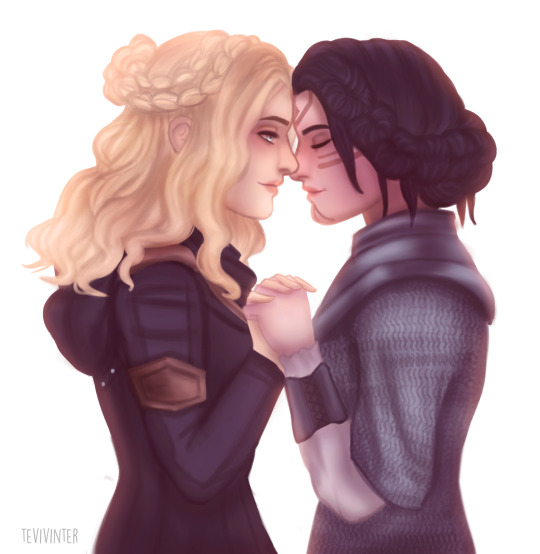
Thank you @tevivinter for the beautiful commission 🥰🥰 I love them so much.
This is a portrait of the lovely Marguerite Cadash-Tethras all grown up, star of the on-hiatus The Herald’s Gambit. The brunette is Petra of Clan Halvor - a warrior caste exile from Orzammar (was Mags involved in that debacle? Possibly. Most likely. It’s a hell of a story I haven’t written yet) known as an undefeated Proving Champion.
This commission did inspire me to finish this little snipped about them and those pretty dwarf braids. Enjoy!
Mine, Petra thought dizzily. Mine.
Petra would never admit it, but this was her favorite part of sharing a watch with Mags.
The two of them sat facing the fire, Mags perched herself on a damp log behind Petra with deft fingers tangled in Petra's dark hair. She tried not to lean into Mags's touch, sitting cross legged between her splayed knees. If she moved just an inch to the right, she could lean against the soft cotton of Mags’s breeches, rest her cheek on her pillowy thigh. Like an exiled casteless with no family or fortune had a right to be there, or really anywhere near someone like Marguerite Cadash-Tethras.
“Pin.” Mags demanded, thrusting her hand over Petra’s shoulder. Petra held up a fistful and she snatched one from between her fingers immediately, used it to secure the last of the intricate braids woven up the side of Petra’s scalp. Then Mags picked up the long leather tie she’d removed when she began and wove together the rest of the loose hair into a much simpler braid, one that she flipped over the opposite shoulder when she finished. Petra reached up to run her fingers over the elegant work, done as neatly as any deep lord’s wife could want.
“Satisfied?” Mags teased, leaning too far in so her breath puffed gently across the earrings in Petra's ear.
“Will it keep my hair out of my eyes while I’m slaying our enemies?” Petra huffed, impatient and irritated at her own distraction.
“And you’ll look beautiful at the same time. Who says you have to sacrifice form for function?” Mags’s smooth voice ended in a laugh. She nudged Petra’s shoulder with her knee. “My turn?”
No, maybe this was her favorite part.
Petra stood from the dust, wiping the assorted leaves and debris from her pants as Mags jumped to her own feet, settling where she’d been. The firelight bounced off her curls, turned them to copper instead of gold. Petra spared a wary glance around them, their companions stretched out on bedrolls, the darkness kept at bay by their small fire. Nothing stirred in the shadows.
They weren’t really alone, but they were the only two awake, which was as close as they could be to being alone.
For these shining, star studded hours, Petra had the sun all to herself.
When she settled on the log, Mags leaned into the space between her thighs, warm and so blessedly assured of herself. Her nimble fingers reached up to start pulling her own pins from the braids decorating her golden locks.
“Stop.” Petra ordered, slowly moving Mags hands away, mouth dry as she smoothed the mostly loose curls tangling from her high ponytail. She tugged the leather tie loose and let them fall into her ungentle hands.
Petra never had anything to herself, not growing up in a clan just scraping by, not learning to fight with a dozen others, but she was the only one who spun gold beneath her fingers every night. So she cherished these hours, pulled them selfishly closer to her every evening.
In the daylight, the woman between her knees would be their brilliant and bright Magpie again, but here…
Mags's smile came slower, softer, in the shadows. Her eyes weren’t quite as steely. The fire and starlight softened all the hard edges of her tongue, made her melt into Petra’s touch as she freed the rest of the braids, ran her fingers through them as softly as she could to untangle them. Mags produced her wide toothed comb and tossed it over her shoulder with a sunny, amused grin.
Petra fought the urge to wind those curls around her fingers, slowly dragging the comb through them instead. Mags almost immediately began to fiddle with the necklace she wore, the bright blaze of sapphires sparkling in the light.
“Hey, tell me a secret.” She demanded, like secrets were easy to buy and trade. Perhaps, to her, they were.
“I don’t have any secrets.” Petra lied, not willing to admit that this, perhaps, was her darkest secret. That these moments were a treasure, a deshyr’s daughter between her thighs, the sun spilling between her fingers. She wasn’t supposed to want the daylight, after all. She belonged to the shadows of the stone. Mags belonged to silk and wealth. That was the way of things. “How do you want your hair?”
“Dealer’s choice.” She said easily, looking over her shoulder and spearing Petra with a chagrined glance. “Everyone has secrets.”
“What’s yours then?” Petra asked, secretly gleeful that she got to decide. Petra would leave as much of the golden curls loose as she could so she could follow their sway as they hiked across bleeding Thedas.
Mags looked away, back towards the fire, her fingers still on the pendant she wore, her mother’s pendant. Petra would never see her mother again, but at least Petra knew where she was. Knew she was safe. Mags may never find the answer.
“I’m afraid.” Mags admitted quietly.
In the dark, she could be. With Petra, perhaps, more than anyone. Unable to help herself, Petra brushed one thumb down the smooth line of skin behind Mags’s ear, a touch she hoped was soothing.
“Of what?” Petra asked, but she already knew. Mags was frightened of small spaces, being alone too long, going home empty handed, and failing her family. Mags never said any of those things, of course, but Petra knew. Petra watched her, after all, far more than she should.
“Spiders.” Mags grinned, lighthearted again. Petra saw just the slightest curve of her smile, uncertain and raw. “Your turn. What are you frightened of?”
Petra said the word before she thought about it. “You.”
Beneath her, Mags stiffened, and Petra immediately began cursing. Mags tugged free of her gentle grip and turned, spearing her with a bewildered and hurt look. “Me? Why are you afraid of me? Is it because I’m…”
Different. Because she had magic she could barely use, more likely to implode on them at any moment than to actually be helpful. Petra watched her struggle with the word before discarding it, a flush rising to her face, temper beginning to eclipse pain.
She never meant to hurt her. Petra would never harm her. If she had her way, she’d become the knight from the stories Mags’s father once weaved, the ones Mags kept hidden in her pack. Tales for a precocious child in a dangerous world, one who needed a bulwark against the storm, a safe place for a Magpie to rest her wings.
If the choice was between hurting Mags or hurting herself, the choice was obvious.
“Fuck.” Petra swore, looking away from those beloved eyes and into the darkness. “I’m scared of losing you because you’re reckless, you’re mad. You think you’re invincible and nothing will ever hurt you. I’m less afraid of dying myself than I am of losing you and that’s terrifying.”
“What?” Not much shocked Mags, but this did. Petra watched her recoil, alarmed by the intensity of emotions.
Alarmed by the confession, more like. Petra could not have the sun, it did not belong to her. She knew it, but if she was going to ruin everything she was going to do it properly. “Since the first day I saw you, I haven’t been able to get you out of my mind. I know you. I know the way you walk, the way your hair curls, the way you smile when you lie, and I could still spend the rest of my days learning more about you. If I lost my sodding eyes, my hearing, all my limbs I would still know you. I would know you anywhere, Marguerite.”
Mags was in her blood, engraved in the stone that lined her heart. She always would be. The same way this memory would haunt her, Mags eyes wide with shock, pulling away to…
Petra stood, nearly tripped over the damn log as she took several steps into the circle of dark surrounding them. She needed to get away from that look, away from the disgust she swore would come next. This was not allowed, this…
“Wait.” Mags whispered plaintively, scrambling up from the ground. “This is where you kiss me, right? You can’t say all of that and not kiss me. It’s not allowed.”
It was Petra’s turn to be shocked. She stared in stunned disbelief as Mags took one slow step forward, a tentative smile curling her lips. Her hair fell loose in waves down her back, turned to a halo of light by the flames behind her. She extended her hand slowly, like she was afraid of startling a nug.
“What?” Petra asked, unsure of the turn this had taken. Mags giggled.
“This is the part of the story where you kiss me. Trust me, I know what I’m talking about.” She was teasing again, her expression lighter, softer than Petra had ever seen it. She couldn’t tell in the shadows, but she swore a blush was creeping up Mags’s fair skin.
The sun was throwing herself at her feet. And Petra was too weak to say no.
She crossed back to Mags, tangling her steady hands into those loose curls, and brought her lips crashing against Mags’s own. Petra swore she could feel the stone inside her softening, melting into a core of lava, blazing and bright as Mags’s lips under hers.
#marguerite cadash-tethras#petra halvor#wlw#dragon age#dwarves forever#dwarfmance#tethras child character#first kiss#they fall into the ball of sunshine/grumpy bitch trope#but that ball of sunshine will cut you faster than the grumpy warrior trust me#petra tossing mags over her shoulder to avoid a fight is a THING#she loves her fiesty deshyr though she really does
13 notes
·
View notes